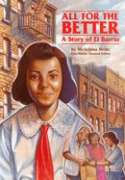
All for the Better: A Story of El Barrio
Written by Nicholasa Mohr
Steck-Vaughn, 1992, 52 pp.
ISBN 978-0811472203
This novel is based on real-life activist Evelina Lopez Antonetty. As a young girl growing up during the days of the Great Depression in Puerto Rico, Evelina is sent off to live with her aunt and uncle in El Barrio, also known as the Spanish Harlem of New York. Evelina’s initial struggles in adjusting to her new life are described, such as living far away from her two younger sisters and mother, having to begin school without knowing English and being bullied by other students. However, Evelina quickly learns English, befriends several girls and excels in school. Evelina also decides to help families obtain their government-assisted groceries by having them fill out the appropriate forms and then going to the distribution center herself with others in order to receive shopping bags full of food for each family. Evelina’s plan of collecting the food for the people of her town who need it continue for months, with more and more people accompanying her to the distribution center to collect food. These acts make Evelina known as an exemplary young lady because of her strength, courage and willingness to help others. The story concludes with Evelina finally reuniting with her mother and siblings about a year and a half after her initial move to New York. In the epilogue, we learn that Evelina grows up to be an extremely involved parent in the education of her children who started the United Bronx Parents organization to improve the conditions in schools and the treatment of children in those schools.
The book supports various global understandings, such as immigration, language issues and cultural stereotypes through Brubaker (2005)’s boundary-maintenance characteristic of diaspora. Although this story discusses some of Evelina’s struggles during her transition period, the story demonstrates the resourcefulness of a community to come together with the help of a determined and hard-working young girl. The story illustrates the idea of a transnational community—a community of immigrants living in New York can come together and live in a hybrid state. Evelina preserves her distinctive identity as a Puerto Rican female living in a community that is comprised of social relationships and “linked members of the diaspora” into this fused community that is El Barrio in Harlem.
The leadership that Evelina takes in helping the families of her community who were suffering during the Great Depression illustrates her ability to push past obstacles in order to help collect and transfer sustenance to starving families. This further highlights how Evelina is able to maintain her distinctive identity even as she moves to a new country and society. Her abilities to push past obstacles are further demonstrated through her capacity to rally parents and establish the United Bronx Parents, which also depicts her ingenuity and contributions to communities in New York. Thus, this story tells the tale of a Puerto Rican female who surpasses cultural stereotypes and contributes greatly to society while maintaining her dual identity. Throughout the book, the changes, hybridity and fluidity of her identity are shown as she grows up and faces a variety of situations. Evelina stands up to bullies even as a recent immigrant herself, and is also able to find a way to have food delivered to her community members, while encouraging them to accept the help they deserve. The different situations that arise highlight this distinctive transnational community that is held together by strong, active members and social relationships.
The author of this story, Nicholasa Mohr, shares many similarities with the main character, Evelina. Her parents immigrated to New York City from Puerto Rico during World War II, and she grew up in the Bronx. She is one of the most published Puerto Rican authors in the United States.
There are several children’s books that could complement the main themes of this book. Specifically, there are notable books that deal with activism, particularly Hispanic communities that come together and fight against injustices in their lives. These books include The Streets are Free by Kurusa, !Si, Se Puede! Yes, We Can! Janitor Strike in L.A. by Diana Cohn, Side by Side/Lado a Lado: The Story of Dolores Huerta and Cesar Chavez/ La Historia de Dolores Huerta y Cesar Chavez by Monica Brown, That’s Not Fair! / No es Justo!: Emma Tenayuca’s Struggle for Justice/La lucha de Emma Tenayuca por la justicia by Carmen Tafolla, and Separate is Never Equal: Sylvia Mendez and Her Family’s Fight for Desegregation by Duncan Tonatiuh. All of these stories share how individuals, adults and children alike, of Hispanic descent or living in a Hispanic country, work towards fighting against parts of their own lives that are unjust. Similarly as in the story of Evelina, these books are based on true events and people and depict how individuals are able to rise and take action against injustices and for a better future for themselves and others in similar positions. These books strongly parallel the story of Evelina and the way she made a difference in her own community.
References
Brubaker, R. (2005). The ‘diaspora’ diaspora. Ethnic and Racial Studies, 28(1), pp. 1-19.
Laura Pantín, Teachers College Columbia University, New York City, NY
WOW Review, Volume VI, Issue 4 by Worlds of Words is licensed under a Creative Commons Attribution-NonCommercial-ShareAlike 4.0 International License. Based on work at https://wowlit.org/on-line-publications/review/vi-4/
